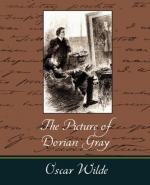For a moment a hideous sense of humiliation came over the woman. Her head drooped. She wiped her eyes with shaking hands. “Sibyl has a mother,” she murmured; “I had none.”
The lad was touched. He went towards her, and stooping down, he kissed her. “I am sorry if I have pained you by asking about my father,” he said, “but I could not help it. I must go now. Good-bye. Don’t forget that you will have only one child now to look after, and believe me that if this man wrongs my sister, I will find out who he is, track him down, and kill him like a dog. I swear it.”
The exaggerated folly of the threat, the passionate gesture that accompanied it, the mad melodramatic words, made life seem more vivid to her. She was familiar with the atmosphere. She breathed more freely, and for the first time for many months she really admired her son. She would have liked to have continued the scene on the same emotional scale, but he cut her short. Trunks had to be carried down and mufflers looked for. The lodging-house drudge bustled in and out. There was the bargaining with the cabman. The moment was lost in vulgar details. It was with a renewed feeling of disappointment that she waved the tattered lace handkerchief from the window, as her son drove away. She was conscious that a great opportunity had been wasted. She consoled herself by telling Sibyl how desolate she felt her life would be, now that she had only one child to look after. She remembered the phrase. It had pleased her. Of the threat she said nothing. It was vividly and dramatically expressed. She felt that they would all laugh at it some day.
CHAPTER 6
“I suppose you have heard the news, Basil?” said Lord Henry that evening as Hallward was shown into a little private room at the Bristol where dinner had been laid for three.
“No, Harry,” answered the artist, giving his hat and coat to the bowing waiter. “What is it? Nothing about politics, I hope! They don’t interest me. There is hardly a single person in the House of Commons worth painting, though many of them would be the better for a little whitewashing.”
“Dorian Gray is engaged to be married,” said Lord Henry, watching him as he spoke.
Hallward started and then frowned. “Dorian engaged to be married!” he cried. “Impossible!”
“It is perfectly true.”
“To whom?”
“To some little actress or other.”
“I can’t believe it. Dorian is far too sensible.”
“Dorian is far too wise not to do foolish things now and then, my dear Basil.”
“Marriage is hardly a thing that one can do now and then, Harry.”
“Except in America,” rejoined Lord Henry languidly. “But I didn’t say he was married. I said he was engaged to be married. There is a great difference. I have a distinct remembrance of being married, but I have no recollection at all of being engaged. I am inclined to think that I never was engaged.”




